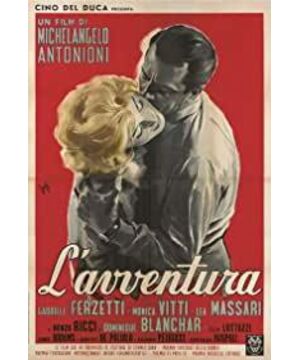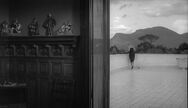This is a world without adventure. Dame Patrizia said one should never hope for sentimentality. Emotions are the enemy of decent people. Patrizia's childhood was a merry-go-round, and she got enough that nothing was more fun than her dog.
Antonioni shows us the despairing side of life in the upper class. Behind the free will is the desire that cannot be filled. The libido is always circulating, monotonous, boring and empty. It all comes so easily that no emotion can be fully experienced. This is also the psychological state of modern people under consumer culture. The meaning of everything is dismantled, and it will be thrown to the wastebasket immediately. This kind of life is completely separated from the life of ordinary working people. Claudia looks out from the hotel, one side of the window is the undeveloped mountain road, and the other side is the corner of the beautifully maintained garden, and she is alone Being bored indoors to the point of grimacing in the mirror. Nowhere to go, nowhere to run.
At the same time, any urge to contemplate is immediately interrupted by the outside world: Claudia laughs at the conversation between the maid and the stranger on the train, Claudia talks to Sandro on the roof and is attracted by the church bell, Claudia and Sandro are in love with each other Ban Shi suddenly realized the grocery store manager behind him. The only time they fell in love desperately was in that empty town that seemed to be abandoned at the end of the human world, and that time a passing train reminded them that there is an entire civilization in this world besides a pair of lovers. How can we keep our inner emotions full in a complex and changing world? Behind every desperate madness (which, as Sandro says, is absurd, but we can't resist) lies a pair of sober eyes, a breath of confusion and calm.
In the first half of the film, Claudia often appears as a third party in the romantic affairs of several other pairs of characters, but since she replaced Anna (she changed into Anna's clothes), by the end of the film she slowly finds herself Trapped in the center of a love triangle. As the film develops, Antonioni has been subtly adjusting the focus of the audience's gaze, each character's appearance breaking the previous composition while forming a new balance.
Antonioni is very good at using deep focus lenses to create richly layered landscapes. Each shot is like a painting. The close-up is the main narrative space, while the long-range is used to house free small molecules.
This is a two-line structure different from the parallel montage, not the juxtaposition in time, but the mutual comparison of characters in space.
Under this careful arrangement, the audience on the island is very much like a state where organic molecules sometimes stray and sometimes collide, which coincides with the allegory of modernity: when people explore the island, the free spread of The state of movement, like the Impressionists' depiction of Parisian street scenes, is "the world of crowds in random motion". It's a physical freedom that Claudia had enjoyed fully as the backdrop to other people's stories, until she too was dragged into that eternal nightmare of desire.
What does the island scene mean to "Adventures"? An island like a volcano, there are still the remains of various ancient civilizations on it, and a tattered pottery pot was instantly shattered. Anna suddenly disappeared from the island. What does the plot that seems to appear in the mystery novel with the theme of the secret room mean? Does her disappearance open up the possibility of other worlds?
The first half of the plot of "Adventures" takes place on an uninhabited island. In the second half of the plot, a magnificent hotel lobby appears. It seems to be two completely opposite scenes. Just like the lady Patrizia said, an island is surrounded by the sea. Surrounded, how pitiful. What Patrizia said of the pitiful is obviously an evaluation of the desolate, dilapidated, unchanging, and even dead island life. She later added: "I like the energy of the crowd, that excites me."
But the ingenious thing about "Adventures" is that, no matter on the island or in the hotel, the lifestyle of this group of wealthy people in the upper class has not changed, and their limited conversations are lackluster.
"The weather seems to have changed." "Can you stop being so preachy? I'll see for myself."
"I hate diving, but what can you do here?" The only way a dude with Patrizia could show his masculinity was diving.
The island is not only the opposite of modern life here, but also unveils the dark side of modern life with its absolutely isomorphic characteristics. The open is also closed, the fresh is ancient, and the thrilling is also accustomed to it. Following the protagonists' exploration of the island, the audience is also thrown into a state of mind that cycles between expectation and failure, a fantasy that repeats itself without any progress.
It is much like Benjamin's mantra of modernity: everything new it expects turns out to be nothing more than a reality that already exists, a novelty that hardly offers a way out of liberation.
View more about L'Avventura reviews








